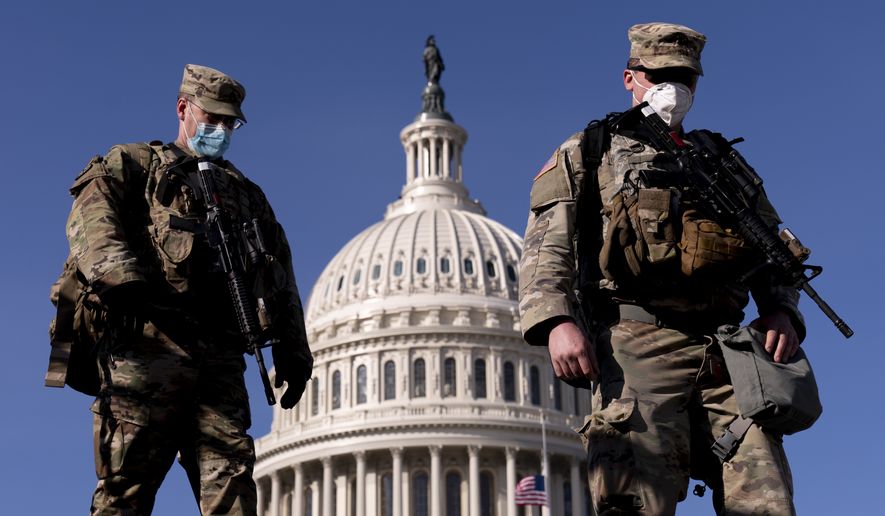The unprecedented security buildup in Washington for Wednesday’s inauguration — 20,000 troops, miles of fences and barricades, mass transit shutdowns — has business owners asking if all this is really necessary.
Federal officials and security experts say the measures are prudent, given the online chatter about a repeat of last week’s storming of the U.S. Capitol — an attack that some authorities now suspect was premeditated rather than spontaneous.
“They are sending an f—ing message. There is no question about it,” said Lew Schiliro, the former head of the FBI’s New York field office.
After a violent mob of pro-Trump supporters forced their way into the Capitol on Jan. 6 to stop Congress from certifying President-elect Joseph R. Biden’s election victory, Washington has been on edge. The insurrection resulted in the deaths of five people, including a police officer.
Vice President Mike Pence vouched for the heavy-handed measures at a security briefing Thursday at the Federal Emergency Management Agency’s headquarters with officials from the FBI, Homeland Security Department and the Secret Service.
He said the Trump administration is committed to ensuring a “safe” inauguration for Mr. Biden.
That event is still days away, but the city of Washington is on lockdown.
More than 20,000 National Guard troops have been called in and dozens of streets and Metro stations have closed. An eight-foot-tall fence has been erected around the Capitol.
Starting Friday all parking garages inside the inauguration perimeter will be closed and anyone inside the perimeter will be stopped and questioned, Mayor Muriel Bowser said.
The mayor also extended the city’s ban on indoor dining at restaurants through the inauguration, citing security concerns.
Inauguration festivities are normally a big boost for local businesses, including the eateries that have been hit hard by COVID-19 shutdowns, and some downtown Washington restaurateurs decried the security measures as overkill.
Bob Materazzi, the owner of Shelley’s Back Room, a downtown cigar bar and restaurant, said he was just starting to get back on his feet when Ms. Bowser extended the ban.
“We were starting to claw back a little bit and she locked us down again,” he said. “The situation is exacerbated by the demonstrations and street closures.”
Mr. Materazzi said his restaurant sales dropped roughly 30% on Wednesday. That’s from sale volume that was already down 50% from pre-pandemic levels.
“We still have to pay our rent and our utilities,” Mr. Materazzi said. “It’s overkill. It’s draconian. It’s over the top.”
A spokeswoman for Ms. Bowser did not return a request for comment.
During last week’s deadly riot at the Capitol, restaurants around downtown preemptively closed, fearing for their staffs’ safety.
One Capitol Hill restaurant, the Alibi, was “overrun” with Trump supporters who refused to wear masks or social distance, owner Martin Scahill told local media.
City officials and federal agencies say the lockdown is necessary and cite an FBI warning of armed protests ahead of the inauguration.
Mr. Schiliro said authorities have to anticipate a worst-case scenario after last week.
“You are not going to be criticized two days later for having too many people,” he said. “You are going to be criticized if you don’t have enough people and something happens.”
Evidence that some aspects of last week’s violence at the Capitol was pre-planned also have officials on edge. Federal authorities are looking into whether attendees at the Jan. 6 rally headlined by President Trump left early during his speech to retrieve items — including zip ties to possibly take hostages.
“There was some planning,” Mr. Schiliro said. “Zip ties, batons, shields — these are not things you bring to a rally. I think there are some clear indications that planning was behind this. It was not as spontaneous as we were led to believe.”
In addition to the FBI warning, violent extremists are signaling their intentions to cause mayhem during the inauguration.
At the security briefing, FBI Director Christopher Wray said agents “are seeing an extensive amount of concerning online chatter” about events surrounding the inauguration.
Several posts in far-right chatrooms invoked the name of Ashli Babbitt, a Trump supporter who was fatally shot trying to enter the Senate chamber during the rampage in the Capitol.
Flyers featuring Babbit distributed online promote an Inauguration Day protest dubbed the “Million Martyr March.”
Even attempts to knock violent right-wing extremists off social media sites, including Twitter and Facebook, have just sent them scrambling to encrypted websites.
Monitoring social media is critical for law enforcement agencies trying to stop a second attack.
“The main thing is information,” Mr. Schiliro said. “They have to gather good information because bad information leads to tragedy.”
As the days tick down to inauguration, more closures and security steps are expected.
The Washington Monument is already closed and the National Park Service is mulling whether to close the National Mall.
“No final decision has been made regarding closures on the National Mall for the inaugural events,” Mike Litters, a spokesperson for the National Park Service said in a statement.
Ms. Bowser has asked downtown hotels and people who rent out rooms on Airbnb to deny lodging to potentially violent protesters.
Airlines joined the security push saying they will prohibit passengers flying to Washington from stashing guns in checked bags.
Mr. Biden also changed his plans because of security concerns. He will no longer take an Amtrak train from his hometown of Wilmington, Delaware, to Washington for the inauguration, a surprising move given his preference for riding the rails during his Senate career.
• Dave Boyer contributed to this report.
• Jeff Mordock can be reached at jmordock@washingtontimes.com.




Please read our comment policy before commenting.